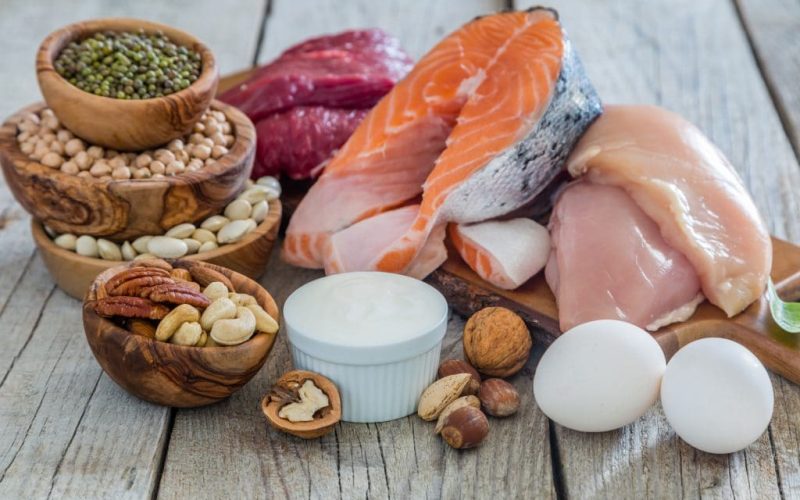When it comes to fat and carbs their health effect is a controversial topic. However, protein is one class of food that everyone agrees is important.
A lot of people who eat enough protein do so to prevent deficiencies, but some people will do better with more protein in their diet.
Numerous studies point out that a high protein intake provides major benefits to those looking to lose weight and those who want to improve their metabolic health.
Below are nine science-based reasons why you should consume more protein.
1. Protein reduces hunger levels are appetite
Fats, protein, and carbs are three micronutrients that affect your body in different ways. Studies show that the most filling nutrient is protein. Eating protein-rich foods help you feel satisfied after a few bites.
This is partly true because protein helps to reduce your level of ghrelin which is the hunger hormone. Peptide YY is the hormone that helps you feel full after eating, and protein helps to increase the level of this hormone.
These two effects on appetite can be very powerful. In one research, an increase in protein intake from 15% to 30 % calories was enough to to make overweight females eat 441 fewer calories daily without needing to eliminate or restrict anything intentionally.
If you need to lose belly fat or lose weight, then you should consider taking protein in place of belly fat and carbs. All you may need to do is reduce your serving of rice or pasta and increase your fish and meat serving.
2. Increases Muscle mass and strength
The building block of your muscles is believed to be protein. Therefore if you eat an adequate amount of protein, you can maintain your strength and muscle mass.
If you’re trying to gain muscles, you’re physically active; if you lift weights, then you need to increase your protein intake. If you are not getting enough protein, there’s no way you can get your desired body shape. Eating high amounts of protein can help to prevent loss of muscles if you are shedding some weight.
3. Good for your bones
A lot of us believe strongly that protein is terrible for our bones, but that isn’t entirely true. This myth stems from the idea that protein causes an increase in your body’s acid load and this leads to calcium leaching from your bones in an attempt to neutralize the excess acid.
However, the majority of long term studies suggest that protein, including those from animal sources, have significant benefits for bone health. People who consume more protein are better able to maintain bone mass as they grow older and have a more reduced risk of fractures and osteopetrosis.
This is especially vital for females as they are at high risk of suffering from osteoporosis after menopause. Feeding on plenty of protein and maintaining a healthy lifestyle is a nice way of preventing such things from happening.
4. Reduces cravings and the desire for a late night snack
There is a major difference between a good craving and hunger. Craving certain foods are not your body needing to be fed, night your brain seeking to be rewarded.
Cravings are quite difficult to control especially when you are one of those people who have a romantic relationship with food. If you are looking to avoid unnecessary food cravings, then the best thing you can do for yourself is avoiding the development of these cravings in the first place.
One of the best methods of prevention is to increase your intake of protein. One study of overweight men revealed that increasing their protein intake to about 25% of calories helped then to reduce cravings by up to 60% and also increased the desire to snack at night by up to 50%.
A similar study featuring overweight adolescent girls revealed that eating a breakfast high in protein will reduce cravings as well as late night snacking.
There are changes that may be mediated by an improvement in a person’s dopamine function. Dopamine is one of the hormones in the brain involved in addiction and cravings.
5. Boosts metabolism and encourages the burning of excess fat
Eating can give your metabolism a boost for a short while. That is because our bodies make use of calories to make use of the nutrients in our foods and also digest the foods we eat. This process is known as the thermic effect of food (TEF).
We must, however, point out that not all foods give similar results. Protein has a much higher thermic effect than carbs or fat.
The number of calories you burn can be increased by a high consumption of protein. Your metabolism can be greatly improved by the same. You can burn as much as 80 to 100 more calories daily when you eat more protein.
Some research, go as far as suggesting you can burn more the 80 to 100 calories. In one study that involved a high protein group and a low protein group, the high protein group burn as much as 250 more calories than the low protein group. That’s equal to doing one hour if intense exercise daily.
6. Lowers your blood pressure
High blood pressure is not only a problem in itself, but also the cause of many other problems. People suffer from stroke, chronic kidney disease, and heart attack when they have high blood pressure.
During a review of 40 controlled trials, it was discovered that protein consumption reduced the top number in a blood pressure reading known as systolic blood pressure by up to 1.76mm Hg on average, and also reduced the bottom under of the reading by 1.15 mm Hg.
Another study revealed that increased protein consumption would not only help to reduce high blood pressure; it can also help get rid of bad cholesterol and triglycerides.
7. Helps to maintain weight loss
Because a high protein diet can help boost your metabolism and cause an automatic reduction in cravings and calories intake, many people looking to lose weight fast tend to consider a high protein diet.
During intentional calorie restriction, protein also has fat loss benefits. In a one year study of 130 overweight individuals feeding on a calorie restricted diet, the group that fed on high protein lost a huge 53% more body fat than the group that eat a similar number of calories.
Of course, shedding the weight is only the beginning. Maintaining weight loss is an even greater challenge for a lot of people.
In one study, a modest increase in participants protein intake was shown to help with the maintenance of weight. If you are looking to shed excess weight, then you must consider making an increase in the amount of protein you consume permanently.
8. Does not harm healthy kidneys
It is a common belief that high protein consumption causes harm to the kidneys. It isn’t far from the truth that reducing protein intake can be healthy for people who have existing kidney problems.
Kidney problems can be very serious, so if you are dealing with one, you shouldn’t increase your protein intake and but yourself at risk.
However, if you do not have pre-existing kidney disease, then you have nothing to bother about when it comes to eating more protein.
9. Help your body repair itself faster after an injury
When you have an injury, and your protein intake is high, then you can be rest assured that your injury will be healed in no time. After All, protein forms the primary building blocks of your organs and tissues.






